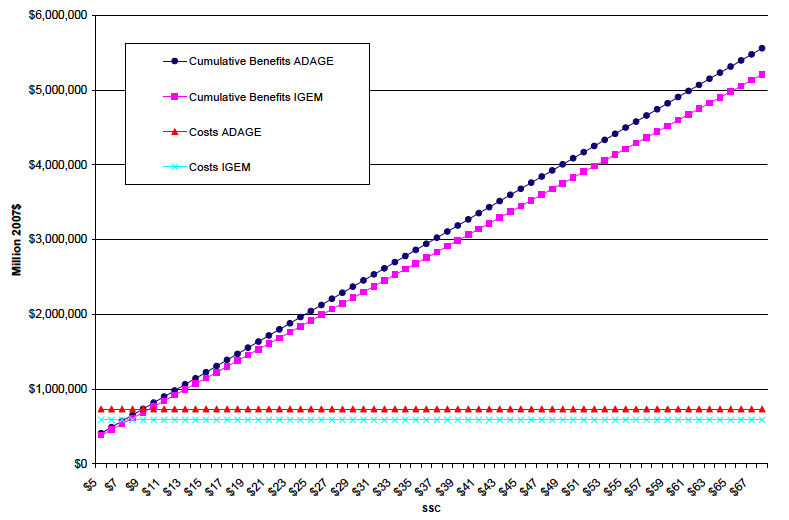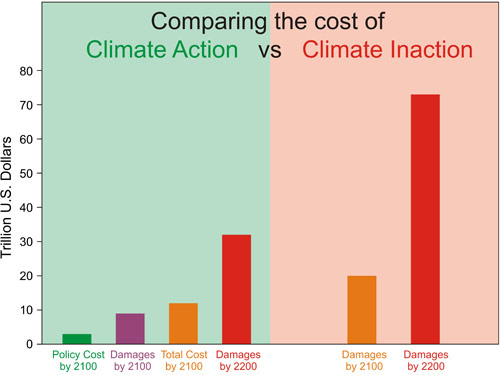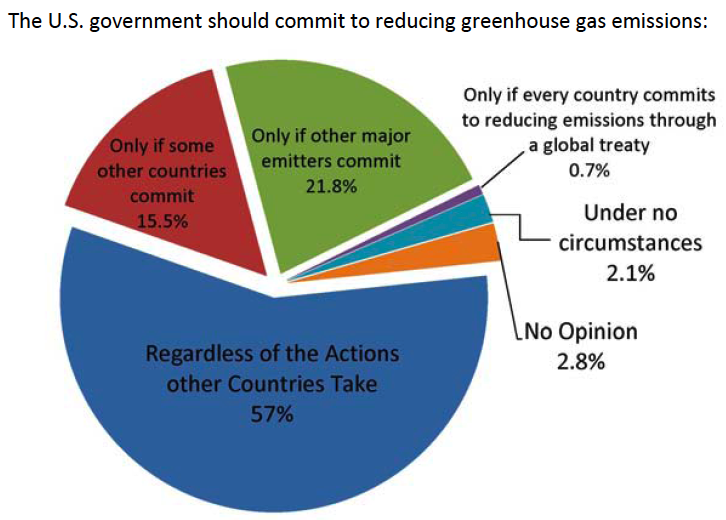Debunking Economic Myths from the Climate Hearing
Posted on 16 April 2011 by dana1981
As we have previously discussed, one of the most disappointing aspects of the recent congressional climate hearing, aside from the propagation of numerous climate myths by John Christy (i.e. see Christy Crocks #1, #2, and #3), was the unchallenged and inaccurate economic testimony of David Montgomery. Unfortunately, the Democrats were only allowed one witness, and wisely chose climate scientist Kerry Emanuel (who did an excellent job). However, this allowed Dr. Montgomery to make assertions well outside of the economic mainstream without any knowledgeable experts present to refute them.
Montgomery's testimony can effectively be grouped into four categories which we will examine in this post: (1) the costs of carbon pricing outweigh the benefits; (2) CO2 limits will have little impact on global temperatures; (3) proposed CO2 legislation is expensive; and (4) renewable energy is more expensive than fossil fuels.
Carbon Pricing Costs vs. Benefits
Montgomery's most frequent claim in the hearing was that the costs of carbon pricing will outweigh its benefits:
"the costs of [CO2 limits] by itself would have far outweighed any benefit we could have gotten from those changes"
"US emission reductions are likely to have costs far greater than their benefits"
"No, [the danger posed to the economy by not acting to reduce climate change] does not [outweigh the economic costs to the country of CO2 limits]"
Since comparing the costs and benefits of any potential action is key to determining whether and how to proceed, it's not surprising that this subject was the main focus of Montgomery's testimony and the Republican congressmen's questioning. However, as we have previously discussed, economic analyses of carbon pricing consistently conclude that its benefits exceed its costs several times over.
The key to answering this question is the social cost of carbon (SCC), which is effectively an estimate of the direct effects of carbon emissions on the economy, and takes into consideration such factors as net agricultural productivity loss, human health effects, property damages from sea level rise, and changes in ecosystem services. Knowing this cost of carbon emissions is key to evaluating the benefits of reducing carbon emissions (the benefits being the amount of damage prevented).
A study by the New York University School of Law Institute for Policy Integrity (NYU IPI) on the costs vs. benefits of the Waxman-Markey climate bill proposed in the USA (more on this legislation below), for example, found that its benefits would exceed its costs if the SCC is greater than $9 per ton of CO2 emitted (Figure 1).

Figure 1: Costs (light blue and red points) and Benefits (dark blue and purple points) vs. SSC values ($ per ton of carbon dioxide) for H.R. 2454 using two economic models (ADAGE and IGEM)
So effectively, Montgomery is arguing that the SCC is below $9 per ton, or at least certainly not much higher. However, this opinion is decidedly outside of the economic mainstream. The NYU IPI also conducted a survey of 144 of the world's top economists with expertise on climate change and in one of the survey questions, asked them their opinion on the true SCC value.
Although their answers varied greatly (the SCC value is a significant economic uncertainty), more than 88% of the economic experts believed the SCC is greater than $9/ton. The median response, in fact, was $50/ton, and 71% believed the value is greater than $20/ton. In short, nearly 90% of the economic experts disagree with Montgomery's statement that the costs of carbon pricing will exceed the benefits, and most of the experts strongly disagree with his position.
NYU IPI is of course not the only group to have conducted a cost-benefit analysis of carbon pricing. There have been numerous other analyses conducted both in the USA and internationally, and the results consistently show the benefits of carbon pricing exceeding costs (i.e. Figure 2).

Figure 2: Approximate costs of climate action (green) and inaction (red) in 2100 and 2200. Sources: German Institute for Economic Research and Watkiss et al. 2005
Tragedy of the Commons
The second-most popular myth in Montgomery's testimony is one which is becoming ever more popular particularly in the USA and Australia:
"We would not notice a difference to the US to anything that was happening to us because of climate [if we introduce CO2 limits]"
"efforts to reduce our own emissions would make almost no difference to global temperature"
Technically these statements are true. Any country can argue that their nation's greenhouse gas emissions reductions alone can only make a negligible impact on global temperatures. This includes the USA, despite the fact that our country is the largest historical CO2 emitter, the second-largest current emitter, and has one of the highest current per capita emissions rates.
This argument can be described as the Tragedy of the Commons: for any individual country acting alone, reducing greenhouse gas emissions could potentially cause an economic disadvantage. And yet, as discussed above, if every country reduces its emissions, the net economic results will be positive. The key is to convince many countries to simultaneously act to reduce their emissions, which is the purpose of international treaties and conferences like at Kyoto and Copenhagen. But if every nation makes the Montgomery argument, nobody reduces emissions, and the net result hurts the global economy.
The NYU IPI survey also asked the economic experts under what circumstances the USA should reduce its emissions (Figure 3).

Figure 3: NYU IPI survey results when asked under what circumstances the USA should reduce its emissions
As you can see, over half of the economics experts responded that the USA should reduce its emissions no matter what other countries do. 72.5% responded that the USA should reduce its emissions if some other countries also commit to reducing theirs, which has already happened (for example, the European Union has had a carbon cap and trade system in place since 2005, and many European nations have aggressive carbon emissions reductions targets). Indeed, this also means that other major emitters have committed to reducing emissions (also see the Kyoto Protocol), in which case over 94% of economic experts agree the US should reduce its emissions. Once again, Montgomery's testimony is well outside the economic mainstream.
The Costs of Climate Legislation
One of the most egregious errors in Montgomery's testimony pertained to the aforementioned Waxman-Markey climate bill which was proposed in the USA and passed the House of Representatives before Republicans blocked it in the Senate:
"the Waxman-Markey [climate] bill with costs in the range of $1,000-2,000 per household, a loss of 1-2% of GDP of what it would be otherwise, and perhaps close to a doubling of electricity prices"
In reality, economic studies have consistently shown that this legislation would have:
- Cost the average American household between $84 and $160 per year by 2020.
- Reduced US gross domestic product (GDP) by less than 1% by 2030 compared to a business-as-usual scenario which does not even account for the economic benefits of the legislation.
- Although electricity prices would rise, due to investments in energy efficiency programs, estimates of impacts on average monthly utility bills by 2030 ranged from a $5.60 decrease to a $2.80 increase.
Montgomery's claims about this legislation are contradicted by every independent economic assessment of the bill, yet as with the rest of his testimony, went unchallenged.
Costs of Renewable Energy
Finally, Montgomery made one very misleading statement about the costs of renewable energy, specifically wind energy:
"[wind energy] is a more expensive way of producing energy than the alternative"
This statement may be true if you eliminate all subsidies and compare the market price (not the true cost) of wind to coal energy. However, as we discuss in the new rebuttal to the myth "renewable energy is too expensive," when accounting for the full costs including impacts on public health, air quality, climate change, etc., the cost of coal power roughly triples and becomes more expensive than almost every current renewable energy technology. Ironically, wind power is already almost as cheap as coal even when ignoring these external costs. And even ignoring these externalities, recent studies have shown that most renewable energy technologies will become cheaper than coal by 2020 or 2030.
Unrepresentative Testimony
It is unfortunate that the only economic "expert" called to testify at this congressional hearing consistently made statements which contradicted the economic climate consensus: that the benefits of carbon pricing will exceed the costs, and that the USA should take action to reduce its greenhouse gas emissions. Montgomery also misrepresented the economic impacts of recently-proposed climate legislation, and the costs of renewable vs. fossil fuel energy.
We can only hope that in the future, testimony presented to US policymakers will reflect the body of economic climate studies more accurately. Montgomery's testimony only served to misinform our policymakers about the economic realities of climate legislation and carbon pricing. These are subjects about which, as with climate science, there is a disturbing abundance of misinformation.































 Arguments
Arguments






























[DB] The correct link is:
http://ec.europa.eu/clima/policies/package/docs/final_report2_en.pdf